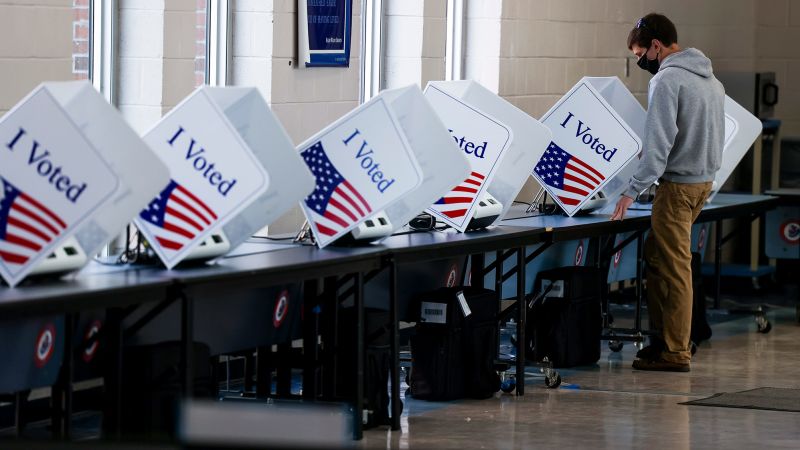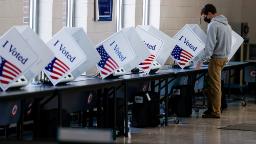

Philadelphia
CNN
—
The Democratic National Committee on Saturday approved a plan to shake up the 2024 presidential primary calendar and demote longtime early voting states Iowa and New Hampshire, but significant questions remain about how the new order will be implemented.
The new calendar upends decades of tradition in which Iowa and New Hampshire were the first two states to hold nominating contests and moves up South Carolina, Nevada, Georgia and Michigan. President Joe Biden has argued the new nominating order would better reflect the diversity of the nation and the Democratic Party.
But the party’s early nomination calendar, which was approved Saturday at the DNC’s winter meeting in Philadelphia, is facing opposition from some impacted states and could remain unsettled for months.
Under the new calendar, South Carolina would hold the first primary on February 3, followed by New Hampshire and Nevada on February 6, Georgia on February 13, and Michigan on February 27. Any state can hold a nomination contest starting March 5.
The changes reflect longstanding concerns from party leaders that the previous calendar, which featured Iowa, New Hampshire, Nevada and South Carolina in early voting, prioritized two states that are largely White and don’t represent the diversity of the party. Iowa has gone first in the nominating process since 1972, while New Hampshire has held the first primary in the process since 1920.
“This calendar reflects the best of who we are as a nation, and it sends a powerful message all across the country,” DNC Chair Jaime Harrison said Saturday.
The calendar passed with overwhelming support. However, while the DNC sets the rules for the party’s nominating process, state governments (or state parties) ultimately set the dates of their contests, and New Hampshire and Georgia likely won’t be able to comply with the assigned dates.
The chairs of the Iowa and New Hampshire Democratic parties objected to the calendar at Saturday’s meeting, noting that Democrats did not have the power in those states to unilaterally change their state laws. Republicans in Iowa and New Hampshire control the office of the governor and both chambers of the state legislature.
Rita Hart, the chair of the Iowa Democratic Party, argued, “Iowa has been put in a position that makes it impossible to comply with both DNC rules and our own state law, which has exactly zero chance of being changed by the Republican legislature.”
Hart said, “Democrats cannot forget about entire groups of voters in our part of the Midwest without doing significant damage to the party.”
Ray Buckley, the chair of the New Hampshire Democratic Party, said the DNC rules committee “knew that Republican leaders in the state would not bend to their will, and even knowing this, the RBC still decided that New Hampshire Democrats should be set up for failure,” referring to the DNC’s Rules and Bylaws Committee.
“Every vote matters in New Hampshire,” Buckley said. “Victories are determined by a small number of independent swing voters. Those voters are already being bombarded by the Republicans, who are saying that Democrats have abandoned New Hampshire.”
New Hampshire has a state law that protects its first-in-the-nation primary status, while Georgia’s primary date is set by Republican Secretary of State Brad Raffensperger and an early primary would open Peach State Republicans up to sanctions from their own national party.
New Hampshire and Georgia now have until June to take steps toward scheduling their contests on the assigned dates. If they don’t, they won’t be able to hold primaries before March 5 without being penalized by the DNC.
While Georgia would likely just hold its primary once any state is allowed to do so, a New Hampshire primary scheduled for “7 days or more immediately preceding the date on which any other state shall hold a similar election,” as state law requires, could lead to delegate penalties for the state party.
Additionally, any candidate who campaigns in or even has their name on the ballot in a noncompliant primary would be unable to receive delegates from that state and could face other penalties.
Despite the implementation hurdles ahead, the calendar passed with overwhelming support, and several officials spoke in support of the new order. Michigan Rep. Debbie Dingell, who has been a leading advocate for her state to join the early-voting calendar, gave a fiery speech Saturday in support of the proposal, saying it would reflect the diversity of the country.
“We are overdue in changing this primary calendar to ensure it reflects the range of ideas, thoughts and hopes of Americans throughout this country,” Dingell said.
While the Democratic rules drop New Hampshire from the second contest (and first primary) into a tie for the second primary, fellow longtime early state Iowa has been removed from the early set entirely.
Like New Hampshire, Iowa is largely White, but it’s also far less politically competitive – then-President Donald Trump won it by 8 points in 2020 – and uses a complex and less accessible caucus format.
Iowa’s early caucuses are also protected by state law, and then-Iowa Democratic Party Chair Ross Wilburn said in December that the party would follow that law when planning its contest while also pledging to reform the process.
The other three early states shouldn’t have a problem complying with the new schedule. In South Carolina, each state party chair has the ability to set the date of their presidential primary. Nevada’s new date matches the one set by state law in 2021, and Michigan this week enacted a law to schedule their primary for February 27 (although the state legislature will have to end its session a few weeks early for it take effect in time).
The calendar approved Saturday applies only to the Democratic party’s nominating process. Republican early-voting states will be unchanged from recent years, with Iowa, New Hampshire, South Carolina and Nevada.
“The [Republican National Committee] unanimously passed its rules over a year ago and solidified the traditional nominating process the American people know and understand,” RNC Chairwoman Ronna McDaniel said in a statement Saturday. “The DNC has decided to break a half-century precedent and cause chaos by altering their primary process, and ultimately abandoning millions of Americans in Iowa and New Hampshire.”
The DNC changes could affect Republicans, especially in Michigan, where the new primary date violates national GOP rules. To avoid a delegate penalty, Michigan Republicans could use a party-run process at a later date.
Ultimately, if Biden seeks a second term, he’s unlikely to face serious opposition, and the order of states would be largely irrelevant. However, the changes demonstrate that the party won’t be permanently attached to the traditional set of early states, and party leaders have already started to prepare to reexamine the schedule again after the 2024 election.
In her speech, Dingell backed that idea: “No one state should have a lock. We do need to revisit this every four years.”
This story has been updated with additional information.
